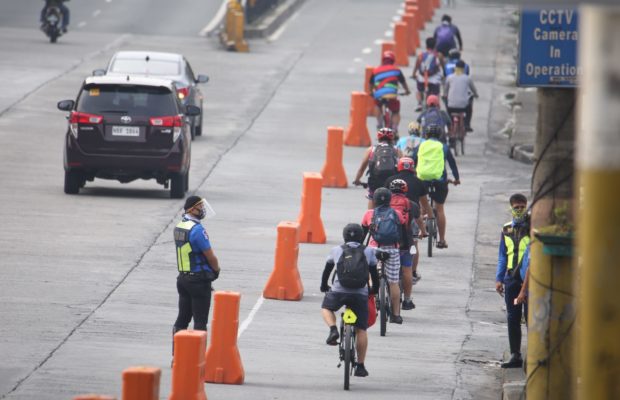
EXCLUSIVE LANE Cyclists try out the bike lane on Edsa, which formally opened on Saturday. Composed of six sections, it stretches from Edsa Aurora to Magallanes southbound. ( /Photo by NIÑO JESUS ORBETA / Philippine Daily Inquirer)
MANILA, Philippines — As transport officials launched a bike lane on Edsa to promote mobility in the middle of the coronavirus pandemic, there was some confusion over whether or not cyclists should be wearing face shields.
On Sunday morning, a day after the formal opening of the protected bike lane, some bikers reported that they were flagged down by traffic enforcers for their lack of face shields. None of them, however, was penalized.
The Department of Transportation (DOTr) earlier clarified that cyclists were not covered by a recent memorandum requiring both passengers and drivers of public transport to wear face shields starting Aug. 15.
But Assistant Transport Secretary Goddes Libiran said this would also depend on the regulations of local government units on mandatory protective equipment.
Advocates optimistic
Despite the confusion, bike advocates were optimistic about the opening of the protected bike lane on Edsa. Stretching from Edsa Aurora to Magallanes southbound, it has six major sections: Aurora to Santolan, Santolan to Ortigas, Ortigas to Shaw, Shaw to Guadalupe, Guadalupe to Buendia and Buendia to Magallanes.
The project is part of the efforts of the DOTr and Metropolitan Manila Development Authority to install protected bike lanes across the metropolis and provide commuters more options due to the limited public transport available.
“Bike lanes in Metro Manila are not just ‘nice to have.’ Today, protected bike lanes are now an absolute necessity especially to front-liners who go to work [on] their bikes,” said Robert Siy of the Move Metro Manila and the MoveAsOne Coalition. Both represent more than 100,000 bikers nationwide.
Economic recovery
A network of protected bike lanes, he added, would support economic recovery as it would allow more front-liners and essential workers to report for work.
It would also improve road safety, reduce the risk of virus transmission and ease the pressure on reduced public transport services, he said.
“We should not hesitate to reduce the lanes for cars in order to provide a wide lane for cyclists. A bike lane can move more than five times the number of people compared to a car lane,” Siy stressed.
—With a report from Mariejo Ramos